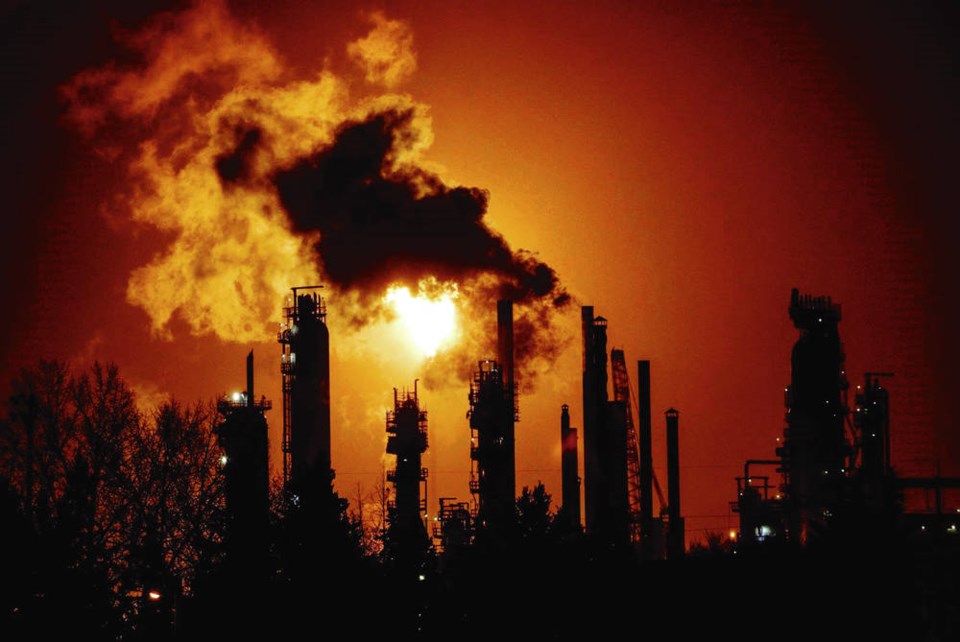Climate Clocks are appearing around the world in cities such as Berlin, New York and Oslo.
Based on data from Germany’s Mercator Institute, they display two numbers: One counts down how long it will take, at current rates of emissions, to burn through our “carbon budget” — the amount of CO2 that can still be released into the atmosphere while limiting global warming to 1.5 degrees C above pre-industrial levels.” The second number tracks growth in the share of global energy supplies that come from renewable energy.
Bear with me, there are plenty of numbers here, but they are vitally important and in essence quite simple, with profound implications for our climate and energy policies, and I have not seen the implications for Canada presented as I do here.
The concept of the carbon budget comes from the Intergovernmental Panel on Climate Change. In its October 2018 Special Report on Global Warming of 1.5 degrees C, the IPCC found “the atmosphere can absorb … no more than 420 gigatonnes (Gt or billion tonnes) of CO2 if we are to stay below the 1.5 degrees C threshold,” and about 1,170 Gt to stay below the 2 degrees C threshold.
But that was from the end of 2017, almost three years ago. When I checked the Mercator Institute’s Climate Clock on Sept. 27, the allowable global emissions are down to 305 Gt for the 1.5 degrees C threshold and 1,055 Gt for 2 degrees C, giving us just seven years, three months and 25 years, one month respectively at current rates of burning.
Canada is just one-200th of the global population, which means our fair share of the global carbon budget is about 1.5 and 5.25 Gt if we want to stay below 1.5 degrees C or 2 degrees C warming respectively.
The Canadian Government reports that “Canada’s total GHG emissions in 2018 were 729 megatonnes [0.73 Gt] of carbon dioxide equivalent.” Although this includes non-CO2 emissions such as methane and nitrous oxides, 80 per cent of this — 587 megatonnes — is carbon dioxide itself.
At current rates, to stay below 1.5 degrees C warming, we have only 2.6 years before exceeding our fair share of CO2 emissions (and 2.1 years if we include all GHG emissions), while we have nine years (or 7.2 years with all GHG emissions) to stay below 2 degrees C warming. The only way we can keep on as we are is if we continue to take way more than our fair share of the global carbon budget.
So forget all the cosy words from politicians of almost all stripes (but not those with green stripes) about how well we are doing and why we should embrace fracking and coal exports for LNG in BC and the tarsands in Alberta. This is a climate emergency and we are on course for disaster unless we rapidly phase out fossil fuels.
Which is why the global countdown initiative is so important, especially here in Canada. Countdown is “a global initiative to champion and accelerate solutions to the climate crisis, turning ideas into action. The goal: To build a better future by cutting greenhouse gas emissions in half by 2030.” Specifically it is counting down to the next UN Climate Change Conference (COP26), to be held in Edinburgh in October 2021.
Led by TED (the folks who bring you Ted Talks) and Future Stewards, with Christiana Figueres and Tom Carnac, the architects of the Paris Climate Agreement, playing a leading role, Countdown launches with a large global TED event on Saturday, Oct. 10. You will hear from a wide range of global leaders about what a healthy, abundant, zero-emission future can look like.
In the week following the launch, there will be a series of Countdown TED events around the world to highlight local action. One of those will be here in B.C., organized by B.C. Drawdown, the B.C. “chapter” of Project Drawdown, which has identified “the 80 most substantive, existing solutions to address climate change, as well as 20 coming solutions.”
Here in Victoria, Creatively United is a key partner, along with Conversations for a One Planet Region in presenting local leaders and stories. CreativelyUnited.org will feature an online preview on Wednesday, Oct. 7, from 11 a.m. to noon, before the B.C. Countdown event, 7-9 p.m. Wednesday, Oct. 14.
Dr. Trevor Hancock is a retired professor and senior scholar at the University of Victoria’s School of Public Health and Social Policy



